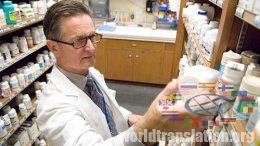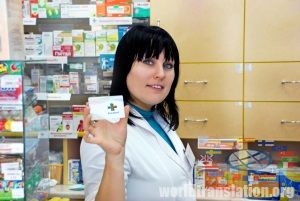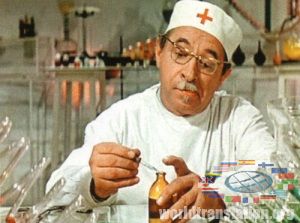Pharmacist vs Provisor

Today the choice of drugs is so large that barely sneezed, we immediately run to the pharmacy. In addition, appeared many cosmetics and personal hygiene products, so the pharmaceutical industry develops, and such professionals, as pharmacists and provisors do not remain unclaimed. Since ancient times, people engaged in treatment with herbs and nature's gifts, homeopathy and now conventional medicine has already appeared. The task of pharmacists and provisors is to use its best achievements.
Since ancient times, people engaged in treatment with herbs and nature's gifts, homeopathy and now conventional medicine has already appeared. The task of pharmacists and provisors is to use its best achievements.
What is the difference between a pharmacist and a provisor? The latter one is a worker with higher pharmaceutical education, the pharmacist, as a rule, has secondary special education. But their duties are mainly similar: receiving the goods, placing them on their places, since drugs require different storage conditions, accounting the presence of goods, formation of applications for delivery, preparation of medicines, informing medical facilities and population about the action of drugs, etc. Because, new drugs, technologies of treatment and diagnostics of diseases are constantly emerging on the pharmaceutical market, such specialists must possess latest information, and improve their knowledge and skills.
Because, new drugs, technologies of treatment and diagnostics of diseases are constantly emerging on the pharmaceutical market, such specialists must possess latest information, and improve their knowledge and skills.
The work of the pharmacist, provisor is closely associated with sick people, it is often tense and nervous. Therefore it is very important to be able to communicate, to understand visitors, all the more so some of them are people of different social, cultural levels. A good pharmacist gradually formed his "customer base", which is a "quality indicator" of his work. Often people turn to the pharmacy without a recipe, only with complaints on health. Of course, the pharmacist, provisor is unable to diagnose, but he must give competent advice, talk about the side effects, contraindications, name the drug analogues, and explain how they differ. Because even the most simple and, at first glance, safe drugs can cause allergic reactions or cause unwanted side effects. Not for nothing that an emblem of this specialty - is the bowl and snake with a drop of poison: this little drop can cure, or may cause irreparable harm.
Often people turn to the pharmacy without a recipe, only with complaints on health. Of course, the pharmacist, provisor is unable to diagnose, but he must give competent advice, talk about the side effects, contraindications, name the drug analogues, and explain how they differ. Because even the most simple and, at first glance, safe drugs can cause allergic reactions or cause unwanted side effects. Not for nothing that an emblem of this specialty - is the bowl and snake with a drop of poison: this little drop can cure, or may cause irreparable harm. And also their knowledge and experience can help to recognize dangerous symptoms and timely send a patient to a doctor. The people of this profession must have developed imaginative memory - to remember and reproduce the color, smell, taste and other parameters of substances, the tactile (touch) memory, mathematical abilities, a mandatory feature of character is responsibility, because defect in their work could lead to tragedy.
And also their knowledge and experience can help to recognize dangerous symptoms and timely send a patient to a doctor. The people of this profession must have developed imaginative memory - to remember and reproduce the color, smell, taste and other parameters of substances, the tactile (touch) memory, mathematical abilities, a mandatory feature of character is responsibility, because defect in their work could lead to tragedy.  And also the pharmacist must be neat, scrupulous and pedantic, not for nothing people say: "Accurately as in the pharmacy!"
And also the pharmacist must be neat, scrupulous and pedantic, not for nothing people say: "Accurately as in the pharmacy!"
Keep in mind that the pharmacist puts himself at risk of get infected of visitors, especially during epidemics of flu. In addition, they have to work with dangerous substances and preparations. Some of them can cause allergies, even in a healthy person. About one more skill which is produced during the work - its an ability to correctly "decode" the recipes of doctors, despite the illegible handwriting.
About one more skill which is produced during the work - its an ability to correctly "decode" the recipes of doctors, despite the illegible handwriting.
Specialized secondary education can be obtained in the medical and pharmaceutical college or school, and higher education - at the university.
The work of the pharmacist is not restricted by a pharmacy, you can work, for example, in research institutes and laboratories, as a medical representatives and managers, analysts, etc.  Particularly insistent and persistent employees, who have received higher education can manage the process of drugs production, control their quality.
Particularly insistent and persistent employees, who have received higher education can manage the process of drugs production, control their quality.
Here you will need the organizational, managerial and business skills, the ability to analyze and forecast profit, profitability of production, etc.